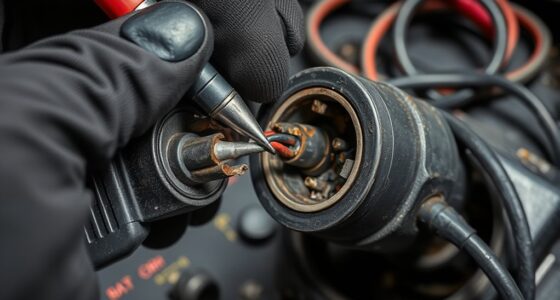Deciding whether to tackle VW Bus repairs yourself or seek professionals depends on your skill level and the complexity of the issue. For simple tasks like changing filters, spark plugs, or tightening bolts, DIY can save money and be rewarding. However, if you’re dealing with electrical, fuel system, or engine problems, it’s safer and more effective to get expert help. To learn more about when to do it yourself or call in a pro, keep exploring these guidelines.
Key Takeaways
- Opt for DIY if the repair involves simple tasks like replacing filters or spark plugs with basic tools.
- Seek professional help for electrical, fuel, or engine diagnostics to ensure safety and proper functioning.
- Prioritize professional assistance when repair complexity exceeds your skill level or requires specialized equipment.
- Consider safety hazards, such as high-voltage or fuel system issues, before attempting DIY repairs.
- Use DIY for cost-effective, low-risk fixes and consult pros for complex, high-stakes repairs to avoid damage and ensure safety.

When faced with a broken appliance or device, deciding whether to attempt a DIY repair or hire a professional can be challenging. You want to fix the problem quickly and efficiently, but you also need to take into account the overall cost effectiveness and safety considerations. Tackling repairs yourself can save money upfront, but if you’re not experienced, you might end up causing more damage or risking injury. On the other hand, hiring a pro usually costs more initially but offers peace of mind, especially when safety is a concern.
Deciding between DIY repairs and hiring a professional involves balancing safety, cost, and skill level.
If you’re thinking about repairing your VW Bus, start by evaluating your skills and the complexity of the issue. Simple fixes, like changing filters, replacing spark plugs, or tightening loose bolts, are often manageable and can be done with basic tools. These tasks are usually cost-effective since you won’t need to pay labor charges, and they don’t pose significant safety risks if you follow instructions carefully. In such cases, DIY makes sense, especially if you’re confident in your abilities. It saves money and gives you a sense of accomplishment.
However, for more complicated problems—like issues with the electrical system, fuel injection, or engine diagnostics—it’s wise to think about safety considerations. These repairs often involve high-voltage components or sensitive parts that, if mishandled, could cause injury or further damage. In such situations, the cost effectiveness of a DIY approach diminishes because improper repairs might lead to costly repairs down the line. Also, safety should always be a priority; working on a vehicle with potential electrical or fuel hazards without proper training can be dangerous.
When deciding whether to DIY or hire a professional, also reflect on the potential for error. Even small mistakes can lead to bigger problems, which might negate any initial savings. If you’re not thoroughly familiar with VW Bug mechanics, the risk of misdiagnosing the issue or improperly repairing it outweighs the benefits of a cheaper, do-it-yourself fix. Conversely, if you have experience and the right tools, tackling the repair yourself can be rewarding and economical.
Additionally, understanding the specific projector technology involved can influence your repair decision—certain components may require specialized knowledge to repair correctly. Ultimately, balancing cost effectiveness with safety considerations will guide your decision. For minor, straightforward repairs, DIY is often the best choice—just be sure to follow safety precautions. For complex or potentially hazardous issues, it’s smarter to seek professional help. This way, you ensure your VW Bus gets fixed right the first time, avoiding costly mistakes and keeping yourself safe in the process.
Frequently Asked Questions
How Do I Identify a Complex VW Bus Repair?
To identify a complex VW Bus repair, start by evaluating the repair’s scope. If diagnostic tools reveal multiple issues or intricate systems like the engine or transmission, it’s likely complex. Repair complexity increases with parts that require specialized knowledge or tools. If you’re unsure or the repair involves major components, it’s best to recognize the signs early and seek professional help, avoiding potential further damage or safety risks.
What Safety Precautions Are Needed for DIY Repairs?
Think of DIY repairs as stepping into a workshop filled with hidden hazards. You need protective gear like gloves and goggles to shield yourself from sharp edges and debris. For electrical safety, make sure the power is off before working on wiring. Ventilate the area well, keep tools organized, and never rush. These precautions protect you from injury and ensure your repairs stay safe and effective.
How Much Does Professional VW Bus Repair Typically Cost?
You’ll find that professional VW bus repair costs vary depending on the issue, but generally, repair costs range from $200 to over $1,000. Cost estimates include parts and labor, with more complex repairs like engine work or transmission repairs being pricier. To avoid surprises, get detailed quotes beforehand. Keep in mind that investing in professional repairs can save you time and guarantee quality work, especially for intricate or safety-critical issues.
Can I Find Reliable Online Tutorials for VW Bus Fixes?
You can definitely find reliable online tutorials for VW bus fixes. Online forums are great for advice and shared experiences, while repair videos offer visual guidance that’s easy to follow. Just make sure to check the credibility of sources and reviews before diving in. With the right resources, you’ll gain confidence and save money by tackling many repairs yourself. Always remember, some issues still require professional help.
What Warranty Options Exist for Professional VW Bus Repairs?
When considering professional VW bus repairs, you should explore warranty coverage options offered by repair shops or dealerships. Many providers offer repair guarantees that protect you if issues reoccur within a specific period. Always ask about warranty coverage before authorizing repairs, so you’re clear on what’s included. This ensures you get reliable service and peace of mind, knowing that any future problems related to the repair are covered under the warranty.
Conclusion
Knowing when to DIY or call in a pro is like steering a winding road—you need to judge your skill and the road ahead. I once tried fixing my VW bus’s transmission, only to find I’d bitten off more than I could chew. Sometimes, admitting you need help is the smartest move—like calling a tow truck before you’re stranded. Trust your instincts, weigh the risks, and remember, sometimes the best repair is knowing when to ask for a hand.









